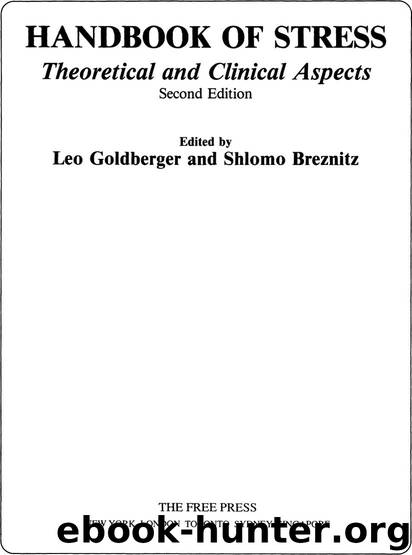Handbook of Stress by Leo Goldberger & Shlomo Breznitz

Author:Leo Goldberger & Shlomo Breznitz
Language: eng
Format: epub
Tags: SOC035000
Publisher: The Free Press
Published: 1993-07-15T00:00:00+00:00
CONSENSUS ON THEORIES AND METHODOLOGIES appropriate to the study of stress, coping, and adaptation is rare. Even more controversial is the complex and relatively new field of psychosocial change in adulthood, an area rich in literature of uneven merit. The objectives of this chapter on stress from a life course perspective must therefore be selective. My goal is to summarize evidence for continuity versus change both in the emotional and cognitive experience of what is stressful and in the buffers that help people deal with stress as they grow from young adulthood toward old age. In keeping with the flood of technological and social innovations, which affect all social strata, a recurrent theme will be social change as stress.
For centuries, theories of adult change were embedded in the humanities. Later, the biological sciences took up this subject. Empirical social and behavioral research on life course change appeared in Europe quite early in the nineteenth century and, as Reinert (1979) noted, Hall’s works on adolescence (1904) and senescence (1922) were among the first reflections of interest in this country. Hall’s contributions were followed by an early textbook of Hollingworth’s (1927), a volume set firmly in a life span framework (Baltes, 1979). From then until the 1960s, interest in adult change was slight; the current multidisciplinary flourish spans little more than a decade. Some of this upsurge can be attributed to intriguing results from studies of children that were continued as the subjects grew to middle age and beyond. Such studies, especially those that include in-depth life histories, as well as structured tests, are at present the method of choice.
One-time surveys covering a broad age range and repeated with different samples frequently suggest life course change in attitudes, beliefs, and behavior, and many life course researchers have found results stimulating enough to pursue longitudinally. For example, some quite consistent differences among age cohorts and between the sexes in regard to stressful conditions in adult life have been reported. National surveys conducted by the University of Michigan’s Institute for Social Research found that, among young adults, single women had much higher scores than did single men on indicators of psychological stress, but among young marrieds with no children, women ranked much lower on the stress index than did men. Widowed women in comparison with widowers (Campbell, Converse, & Rogers, 1976) also reported fewer stress symptoms. Among the divorced, on the other hand, in a 1957 survey by the institute, women were far more likely than men to report stress symptoms, and there was little change in this respect when the same questions were repeated with another sample about 20 years later (Institute for Social Research, 1979). A recent cross-sectional study of divorce (which has since become a longitudinal research program) also reported more distress among women than among men but only in the turbulent predecision period; once divorce proceedings had been initiated, men ranked higher on stress indicators (Chiriboga & Cutler, 1977). This sample ranged in age from 20 to 70, and among
Download
This site does not store any files on its server. We only index and link to content provided by other sites. Please contact the content providers to delete copyright contents if any and email us, we'll remove relevant links or contents immediately.
Should I Stay or Should I Go? by Ramani Durvasula(7652)
Why We Sleep: Unlocking the Power of Sleep and Dreams by Matthew Walker(6695)
Fear by Osho(4727)
Flow by Mihaly Csikszentmihalyi(4685)
Rising Strong by Brene Brown(4448)
Why We Sleep by Matthew Walker(4433)
The Hacking of the American Mind by Robert H. Lustig(4373)
How to Change Your Mind by Michael Pollan(4355)
Too Much and Not the Mood by Durga Chew-Bose(4337)
Lost Connections by Johann Hari(4169)
He's Just Not That Into You by Greg Behrendt & Liz Tuccillo(3889)
Evolve Your Brain by Joe Dispenza(3668)
The Courage to Be Disliked by Ichiro Kishimi & Fumitake Koga(3482)
Crazy Is My Superpower by A.J. Mendez Brooks(3394)
In Cold Blood by Truman Capote(3374)
Resisting Happiness by Matthew Kelly(3337)
What If This Were Enough? by Heather Havrilesky(3308)
The Book of Human Emotions by Tiffany Watt Smith(3294)
Descartes' Error by Antonio Damasio(3270)
